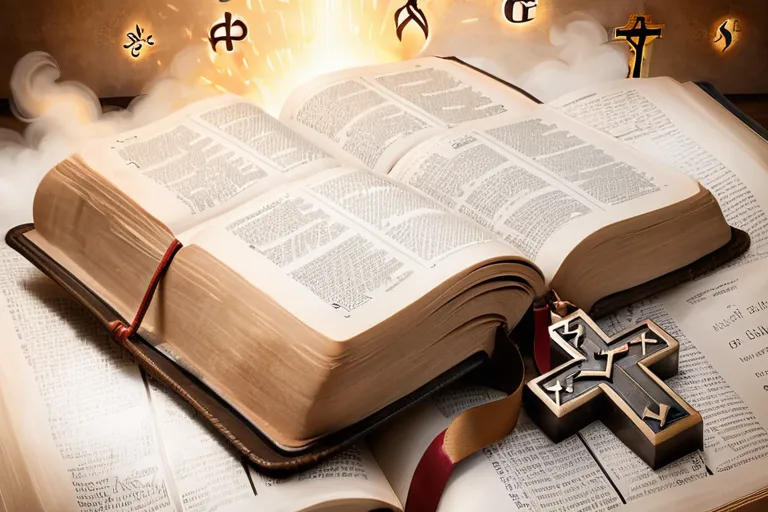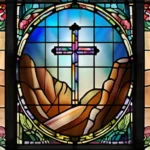Exploring the prophetic book of Micah and its relevance to Christian beliefs
Delve into the Old Testament book of Micah, a prophetic text that holds great significance for Christians. This article will uncover the key messages, themes, and predictions found in Micah’s prophecy and discuss their importance within Christianity.
The Book of Micah: An Overview
Imagine the Book of Micah as a lighthouse, guiding us through the tumultuous seas of biblical history and prophecy. Situated between the books of Hosea and Nahum in the Old Testament, this prophetic book is attributed to the prophet Micah, who lived during the 8th century BCE, specifically around the reigns of King Hezekiah and Ashur-banipal.
Micah’s prophecy was a response to the socio-political climate of his time. The kingdom of Israel had experienced a period of prosperity under King Jeroboam II, but this prosperity came at a cost. The rich were becoming richer, while the poor were being oppressed, much like “the mighty are plundering the weak”, as Micah so vividly describes in his prophecy.
The prophet’s mission was to call out societal injustices and warn of God’s impending judgment. He saw himself not just as a messenger, but as someone who would “prophesy with my voice like a trumpet,” according to Micah 3:8. His words were sharp and unflinching, much like the edge of a sword, cutting through the complacency and corruption of his time.
Historically, Micah’s prophecy was a mirror held up to society, reflecting back its sins and shortcomings. But this wasn’t merely about condemnation; it was also about hope. Micah 5:2 speaks of the coming of a great leader who would restore justice and peace, foreshadowing the future fulfillment in Jesus Christ.
In essence, Micah’s prophecy is a powerful reminder for Christians today that faith isn’t just about personal salvation but also about living out righteousness and justice. As we read his words, we are challenged to examine our own lives and communities, asking ourselves: Are we contributing to the oppression of others or working towards restoration and peace?
Micah’s prophecy stands as a beacon of truth in a world often shrouded in darkness. It invites us to be not just passive observers but active participants in God’s mission for justice and righteousness.
Micah’s Prophecies: Key Messages
When we delve into Micah’s prophecies, we find ourselves in the heart of justice and righteousness. These themes are like a lighthouse guiding us through the tumultuous waters of human morality. How often do we wonder, ‘What does it mean to truly be just?’ Micah’s voice rings out with clarity: it’s not about complex laws or strict rules but about treating others as you would want to be treated. He speaks of the “deed”, a term he uses repeatedly, urging us to act with integrity and fairness in all our dealings.
But what happens when we fail to live up to these standards? Micah doesn’t shy away from addressing God’s wrath. This isn’t just about punishment; it’s a call for reflection. He warns, “Can I forget any longer those whom I have made?” (Micah 7:18). It’s as if he’s saying, ‘How can you forget the ones you created?’ This rhetorical question makes us pause and consider our actions.
Imagine Micah’s prophecy as a mirror, reflecting back to us the very essence of who we are supposed to be. He envisions a society where judgment is not harsh but transformative, leading to a path of righteousness. The imagery he uses—like the “vines” and “fig trees” that bear no fruit (Micah 7:1)—is powerful, painting a picture of a world in need of renewal.
Micah’s message is not just about the future; it’s also about the present. He challenges us to look within ourselves and ask if we are living up to our potential. Are we like those who “have no faithfulness, and among them there is no knowledge of God” (Micah 6:12)? The urgency in his words compels us to act now, not just later.
In exploring Micah’s prophecies, Christians find not only historical relevance but also a guide for their own lives. His teachings on justice and righteousness resonate deeply, urging us to be more than just passive observers of the world’s injustices. Instead, we are called to be active participants in bringing about change.
Through his words, Micah challenges us to “do justice, and to love kindness” (Micah 6:8), a call that is as relevant today as it was centuries ago. By embracing these principles, we not only honor the prophetic voice of Micah but also contribute to building a more just and compassionate world.
Micah’s Prophecy of Bethlehem
Imagine you’re walking through a dense forest, lost and unsure of your path forward. Suddenly, a guide steps out, armed with a map that reveals the way to a hidden gem—a place where hope is born and life’s greatest mysteries are unraveled. In much the same way, Micah’s prophecy of Bethlehem serves as such a map for Christians, pointing them to the cradle of salvation itself.
Turn now to Micah 5:2, where the prophet speaks with clarity and precision about the coming King who will arise from the small town of Bethlehem. This passage is like finding a rare, sparkling gem amidst a field of pebbles, shining brightly as it foretells the birth of Christ.
But why does this matter so much to Christians? Isn’t Jesus’ birth just another historical event in an ancient timeline? Well, consider if you were lost in a dark cave and suddenly someone pointed out a light source that could lead you out. That’s exactly what Micah did for the people of his time—and for us today. He showed them a way to true liberation through the birth of Jesus.
Through this prophecy, Christians see a deepening of their faith in the God who is both just and merciful. It reminds us that salvation wasn’t just an abstract concept but a concrete person—Jesus, born in Bethlehem. This prophecy also highlights the significance of God’s sovereignty over time and history, guiding events to fulfill his plans.
Reflect on this: How would your life be different if you knew the path was already laid out for you? For Christians, Micah’s prophecy of Bethlehem not only reveals the path but also points to a future where justice reigns and God’s mercy triumphs over sin. It’s like having a lighthouse in the midst of a stormy sea, guiding us toward safety and hope.
The Significance of Micah’s Prophecy for Christianity
Imagine diving into the rich tapestry of biblical prophecy, where each thread weaves through the heart of faith and history. The book of Micah, often overshadowed by the grandeur of Isaiah or the vivid imagery of Revelation, offers a profound insight into the nature of God and salvation. How does Micah’s message resonate with Christian beliefs? Let’s explore.
Is Micah just another prophet, or is there something more significant in his words? His prophecies challenge us to think deeply about what it means to follow a loving yet righteous God. Consider the vivid imagery of Micah’s descriptions—does he not paint a picture of a compassionate deity who desires mercy and righteousness rather than sacrifice (6:6-8)?
How do these words align with Christian teachings on God’s character and attributes? If Micah describes God as one who hates evil, why should this matter to us? It underscores the idea that our relationship with Him is not just about adherence to rules but living out a life of justice and compassion. This mirrors the central theme in Jesus’ teachings: love thy neighbor.
Moreover, Micah’s prophecy of salvation extends beyond individual piety; it speaks of a broader restoration and healing for all (4:1-4). How does this concept deepen our understanding of what salvation entails? Is it merely forgiveness of sins or is there more—restoration, peace, and unity?
These questions invite us to re-examine our faith through the lens of Micah’s prophecy. As Christians, we often focus on Jesus as the fulfillment of prophecies, but Micah’s voice reminds us that God’s salvation was always intended for all peoples and nations (4:1-5). This perspective broadens our vision of Christian mission to include justice and reconciliation.
Reflecting on these prophetic words, we can’t help but see the interwoven threads of justice, mercy, and love. How do these core values shape our response to a world in need? Is it just about personal salvation or is there an urgent call for communal transformation?
In conclusion, Micah’s prophecy challenges us to think beyond individual piety and towards a life of justice and compassion. It invites us to see the grand narrative of God’s kingdom extending to all corners of the earth. As we delve deeper into these prophetic writings, may they inspire us to live out our faith with greater integrity and purpose.
Micah’s Prophecy: A Call to Repentance
Imagine Micah’s prophecy as a beacon, calling Christians to a path of repentance and righteousness. How often do we, as followers of Christ, truly listen to this call? In Micah, we find a profound message: ‘Hear what the Lord says of Sion, and declare to Judah what comes from the mouth of the God of hosts:
‘Has anyone ever been like this in your eyes? Who gives Messengers to run in front of them, when the Lord prepares a way for his wrath, which he orders with speed?’ (Micah 2:3-4)
This passage is not just a historical narrative; it’s a living call to action. It challenges us to consider whether we are walking in accordance with God’s will or if we are merely going through the motions of daily life. Are we, as Christians, ready to face the consequences of our actions? The prophets of old often faced opposition and hostility for their messages of repentance, but they persisted because they knew the stakes were high.
Repentance in Micah’s prophecy is not just a one-time event; it’s a continuous process. It involves acknowledging our sins, turning away from them, and walking in newness of life. This concept mirrors Christ’s teachings on forgiveness and renewal found throughout the Gospels. How can we claim to follow Jesus if we do not embrace this call to repentance?
Consider the metaphor of a river; it flows continuously, carrying with it both sediment and debris. Just as the river needs periodic cleaning to ensure its purity, our lives need regular repentance to maintain spiritual health. Micah’s prophecy serves as a reminder that without constant cleansing, we risk becoming stagnant or even harmful to others.
As Christians today, how do we respond to this call? Do we embrace it with open hearts and minds, or do we shy away from the uncomfortable truth of our shortcomings? The choice is ours. By heeding Micah’s prophecy, we can truly experience transformation, not just in our daily lives but in our very essence as followers of Christ.
The Legacy of Micah’s Prophecy
As we delve into the legacy of Micah’s prophecy, it becomes clear that his words continue to resonate deeply within Christian thought and practice. How can one book, written centuries ago, still hold such profound relevance in our contemporary world? Could it be that Micah’s prophetic voice is not just a relic of history but a living, breathing testament to God’s enduring love and justice?
Imagine walking through the streets of Bethlehem or Jerusalem during Micah’s time. The air would be thick with the scent of olive oil and the hum of daily life. Yet, amidst this ordinary backdrop, Micah saw something extraordinary—a divine message that would echo through the ages. His prophecies were not just warnings but a call to action, urging his people to turn away from sin and embrace righteousness.
The lasting impact of Micah’s prophecy lies in its timeless themes: social justice, moral accountability, and the call to live according to God’s will. These are not abstract concepts; they speak directly to our hearts today. How often do we find ourselves complacent in our daily routines, unaware of the urgent need for change? Micah reminds us that true faith is not just about personal piety but about how we treat others and uphold justice.
Moreover, Micah’s prophecy challenges Christians to be more than just passive observers. It calls them to active participation in making the world a better place. Is it not our responsibility to advocate for those who are oppressed, to speak out against injustice, and to work towards a society that reflects God’s love? These questions compel us to look beyond ourselves and into the lives of others.
The legacy of Micah’s prophecy is also seen in its call for moral accountability. In an age where moral relativism often prevails, Micah stands as a reminder that there are absolutes, that our actions have consequences, both individually and collectively. This prophetic voice cuts through the noise of our modern world, urging us to examine our own lives and commitments.
In conclusion, Micah’s prophecy is not just a historical artifact but a living document that continues to challenge and inspire Christians today. It invites us to be agents of change in our communities, to seek justice for all, and to live with integrity and compassion. As we reflect on these ancient words, may they guide us towards a more just and loving world.
Conclusion
 By understanding the prophecies of Micah, Christians can gain valuable insights into God’s plan for humanity, strengthen their faith, and better comprehend the nature of salvation.
By understanding the prophecies of Micah, Christians can gain valuable insights into God’s plan for humanity, strengthen their faith, and better comprehend the nature of salvation.











